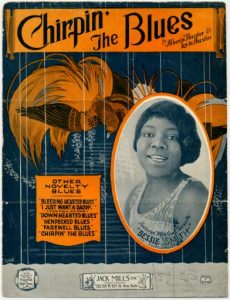Though her rein took place during the 1920’s the “Empress of the Blues,” Bessie Smith, is still a household name.1 Blues queens, like Bessie Smith, had a huge impact on the music scene of the time but they also made considerable contributions to the cultural environment of the time. Their songs, often times characterized by their themes of love and loss, talked about the struggles of being a black woman and the consequences of the cross section between race, gender, and class. One example of this is Bessie Smith’s “A Good Man is Hard To Find” which talks about a cheating husband but also the difficulty of leaving a relationship due to outside forces.
The authenticity of the stories within blues queens’ music is something that has been continually questioned.2 The success of these women put them in the spotlight and made them someone to critique as well as a figure to look up to. This popularity is exhibited through the numerous radio spots, advertisements for sold out performances, and music endorsements, like the one below.3
Though the music was the main event of a Blues queen’s career, if the authenticity of their music and the narrative surrounding them was questioned then they could lose support and ultimately those gigs would go away. This is not a singular issue, though, rather it is a societal issue rooted in sexism and racism. Bessie Smith is not exempt from this kind of critique.4 She was very rich and very famous, and sometimes its hard to think that a figure like that could experience things like cheating, addiction, or poverty. Bessie Smith was not exempt from critique but she was a much more complicated woman than met the eye. In “A Good Man is Hard to Find” Bessie Smith sings about a rather specific situation in which a man cheats on a woman and the woman wishes she could go back in time and fix the situation. Bessie Smith may, or may not have experienced this specific situation but she did experience love and loss, and could relate to the feelings exhibited in the song. Her parents passed away when she was very young and she supported herself by singing on street corners. She was married twice, the first marriage ending in the death of her husband and the second ending in a painful divorce.5 In Bessie Smith’s case, her music is a reflection of her experiences. There are a lot of scenarios in her songs that she may not have lived through but she experienced the kind of pain and loss that permeated many of them. Ultimately, bringing attention to these experiences and showing the resilience and ingenuity of women she should be lauded as a feminist and a positive role model.
1 Lordi, Emily J.. Black Resonance: Iconic Women Singers and African American Literature. New Brunswick: Rutgers University Press, 2013.
2 Suisman, David. “Was Bessie Smith a feminist?.” Souls, vol. 1 iss. 1, 1999.
3 Austin, Lovie adn Alberta Hunter. “Chripin’ the Blues.” New York: Jack Mills, Inc, 1923.
4 Blackwell, Amy Hackney. “Ma Rainey.” In The American Mosaic: The African American Experience, ABC-CLIO, 2018.
5 “Bessie Smith.” In The American Mosaic: The African American Experience, ABC-CLIO, 2018.

